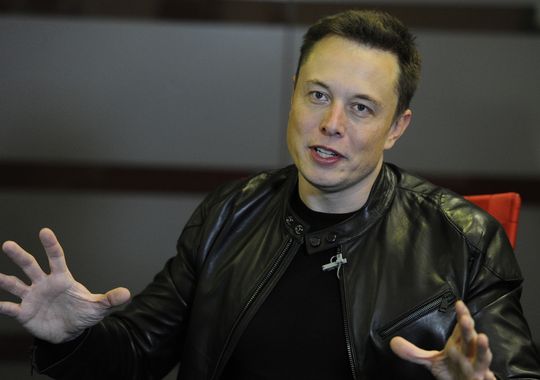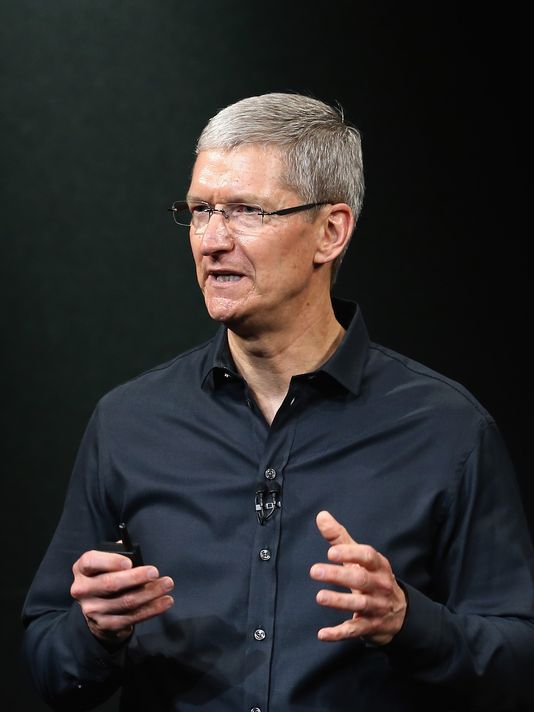2014: Apple's crunch year to prove innovation chops
SAN FRANCISCO — Apple CEO Tim Cook spent 2013 fighting creeping concerns that the company has lost its innovation edge and hinting about new products that will take the Silicon Valley giant into exciting new categories. 2014 is the year he has to deliver, according to investors and analysts.
While it was going to be impossible to replace the creative genius of Steve Jobs, Cook is increasingly seen as a smart operations leader, rather than a creative innovator.
Without compelling new products in big new markets next year, worries will grow that Apple's days as a hot growth company are over, limiting future gains for the shares.
"People are questioning Cook's status as a leader of an innovative company. Maybe he's just a great operator," said Josh Stewart, portfolio manager at the Wasatch World Innovators Fund, who sold his Apple shares earlier this year.
When Jobs died Oct. 5, 2011, there were initial questions about Cook's ability to replace the co-founder, but Stewart disagreed because Apple had a long growth runway in tablets, the iPhone was a hot product and they had a pipeline of other products in development.
"That was more than two years ago and there's been nothing else so far," Stewart added. "I got frustrated and moved on."
Such worry even prompted one analyst to suggest Apple should buy electric car company Tesla Motors, partly because founder and CEO Elon Musk is considered more capable of driving future innovation.
Apple spokesman Steve Dowling declined to comment, as did a spokeswoman from Tesla.
Stewart's fund invests in companies that are gaining big market share from legacy companies through innovative new products. And Apple is now losing share in the tablet and smart phone markets, mainly to devices running on Google's Android mobile operating system.
"2014 will be hard," Stewart added. "Unless they come up with something we haven't thought of yet it will be hard to drive double-digit sales growth from here."
NEW PRODUCT CATEGORIES
Apple introduced the iPod in October 2001, revolutionizing music consumption. The iPhone came out in January 2007 and quickly dominated the lucrative high end of the mobile phone industry. The iPad came three years later, creating a new category that is still eating into the huge PC sector.
Since then, the company has updated existing products with cutting-edge technology — such as a finger-print sensor and the first 64 bit application processor in a smartphone — but Apple has not launched a new product in a big new category.
In April, Cook dropped a big hint during a conference call with analysts, saying "amazing new hardware, software, and services" would be introduced in the fall and through 2014.
Analysts and investors thought that suggested Apple was looking to move beyond computers, smartphones and tablets into other technology such as a smart watch or a connected TV.
What followed was a series of updates of existing products, such as the iPad Air, the iPhone 5s and 5c and an iPad mini with a Retina display. These got rave reviews and most have sold like hot cakes, but they did not take Apple into new categories.
During Apple's Oct. 28 earnings conference call with Wall Street, Cook said he saw "significant opportunities ahead" for the company in "current product categories and new ones."
Tony Sacconaghi, an analyst at Sanford C. Bernstein, noted there had been no new product categories since Cook's April comments and asked if investors should still expect something in 2013 or the first half of 2014.
Cook stressed that during the April conference call he did not promise new product categories in that time frame.
"But what I have said is that you'll see — I've said that you would see some exciting new products from us in the fall of this year and across 2014. And I obviously stand by that, and you've seen a lot of things over the last couple of months," Cook added. "We obviously believe that we can use our skills in building other great products that are in categories that represent areas where we do not participate today."
iWATCH? iTV?
Analysts and investors expect Apple to come out with some type of smart watch next year and some still hope for a TV from the company that would replicate the music success of the iPod, but in video.
"Apple definitely needs to keep innovating, but we have not picked up anything from the supply chain that either are close," said Brad Gastwirth of research firm ABR Investment Strategy.
Other wearable technology may be in the works, along with a larger iPhone and iPad and mobile devices with curved displays, according to analysts.
Even if those products do materialize in 2014, they may not be enough to move the needle at a company that generated more than $170 billion in revenue during its latest fiscal year.
A smart watch could bring in annual revenue in the low single-digit billions of dollars, which would generate about 1% to 2% incremental sales growth for Apple, Bernstein's Sacconaghi estimates.
"That would help investor sentiment, proving that Apple is still an innovator. But it's still unlikely to be very material financially," he added.
A new type of TV could be a $10 billion market for Apple, but that is about 6% incremental revenue for the company, according to the analyst.
"We need something revolutionary from Apple that will move the needle and iWatch and iTV won't do it," said Brian Marshall, an analyst at ISI Group. "They are in a tough spot and run the risk of just being dependent on upgrading their installed base every few years."
iCAR?
Apple should look at other, much larger markets, some analysts and investors reckon.
Adnaan Ahmad, a veteran tech analyst at Berenberg Bank, wrote an open letter to Cook and Apple Chairman Art Levinson on Oct. 25 suggesting the company acquire Tesla.
The key to Apple's future and investors' perception of the company is not about how many iPhones are going to ship, or profit margins, or evening whether a larger phone is coming in 2014 or bigger share buy backs, Ahmad wrote.
"It is all about what new avenues of growth there are for Apple over the next five years and beyond," he added.
The TV market, with roughly $100 billion in annual revenue, and the watch business, which is worth about $40 billion annually, are not big enough, he argued.
The auto industry, in contrast, is a $1.6 trillion a year market which is in the early stages of switching to hybrid and electric vehicles, some of which are already sold by Tesla.
An acquisition of Tesla "would radically alter Apple's growth profile," Ahmad wrote, adding that Apple's strengths — its brand, cult-like following and product design skills — would be well suited to modernizing the auto industry.
Every percentage point of global auto industry revenue grabbed by an Apple "iCar" would equal at least $16 billion in annual revenue — or 16% of the TV market and 40% of the watch sector, the analyst said.
If it bought Tesla, Apple would also get Musk, who helped start PayPal and also runs SpaceX, a pioneering space rocket company.

Elon Musk, founder of Tesla Motors(Photo: Maxine Park, USA TODAY)
"In Elon Musk, you could strike up a partnership and obtain a new iconic partner to lead Apple's innovation," Ahmad wrote. Musk's PayPal experience could also help Apple accelerate mobile payments initiatives including iBeacon and Passbook, the analyst added.
'OUT OF THE BOX'
Ahmad said the proposal was likely to be ridiculed. Bernstein's Sacconaghi said such a large acquisition would be uncharacteristic of Apple, which is fiercely proud of its products and generally develops them itself, rather than buying them through M&A deals.
However, the fact that some on Wall Street are talking about such a radical idea highlights Apple's problems and Cook's predicament.
"People are not counting the days until the next new product to see if Apple has lost their innovation mojo. But people are asking how they can grow from this huge revenue base and what new products can fuel that. That's a bigger concern," Sacconaghi said.
Apple sales grew 45% in fiscal 2012, but that growth dropped to 9% the following year. The company's revenue growth rate may slip to 3.5% in fiscal 2014 and 2.6% in 2015, according to Sacconaghi.
"The problem I see with your stock is that in the absence of any 'out of the box' move to a sizable new vertical market, the key debate will always be about your ability to sustain these "abnormal" margins in your iPhone business," Ahmad told Cook and Levinson.
In the past, similar efforts to maintain juicy hardware margins by other historically great consumer tech companies, such as Sony and Nokia, failed, he noted.










